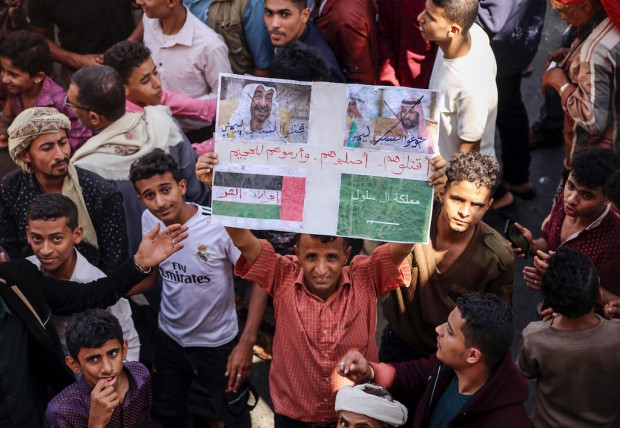‘Very dangerous’: UAE assassination campaign in Yemen leaves coalition exposed

Yemeni people hold up national flags during a demonstration organized by members of the Islamist al-Islah party (AFP)
SANAA – They're supposed to be on the same side.
Since 2015, al-Islah, the Yemeni branch of the Muslim Brotherhood, and the United Arab Emirates have been fighting against Houthi rebels in an attempt to prop up the internationally recognised government of President Abd Rabbuh Mansour Hadi.
But on Tuesday, Buzzfeed revealed that the Emiratis had hired a team of American and Israeli mercenaries to assassinate members of the Islahi leadership – enraging the influential party and exposing the UAE's presence in Yemen to fierce criticism.
It has also placed Saudi Arabia, which leads an anti-Houthi coalition and is closely allied to both the Islahis and Emiratis, in a deeply uncomfortable position.
"Although the announced aim of the Emirates in Yemen is to support the legitimate government, it fights legitimacy with all its might," Issa Qadhi, a member of al-Islah in Taiz, told MEE.
Saudi Arabia is the leader of the coalition, so how it can keep silent against the UAEs violations in Yemen?
– Mohammed Abdulwadood, al-Islah member
Instead of prioritising the defeat of the Iran-allied Houthi rebels, Qadhi said, "the UAE made the annihilation of the al-Islah party the first aim of its presence in Yemen".
"The UAE is willing to destroy the whole country and bring mercenaries from around the world to annihilate al-Islah," he added.
"The UAE is cunning but God does not help the cunning to succeed."
Questions for Riyadh
Abu Dhabi has long considered the Muslim Brotherhood an enemy, as has Saudi Arabia. However, Riyadh has decades-long ties with al-Islah, with the party an effective client throughout Ali Abdullah Saleh's 20-year rule of a united Yemen.
Together, the Saudis, Emiratis and Islahis were instrumental in seizing Aden and the surrounding area from the Houthi rebels, and gaining a strategic foothold in the country in mid-2015.
Since then, however, the UAE-Islah relationship has soured considerably, and in October 2017 clashes broke out in the southern city of Aden between Islahis and Emirati proxy militias.
In August, al-Islah's Aden branch issued a statement accusing unidentified "militias" of targeting the group since the beginning of the war in March 2015.
The statement notably listed the assassination of nine Islahi leaders, the arbitrary detention of four others, raids of the partys headquarters on at least five occasions, and four raids of homes belonging to al-Islah leaders in Aden.
At the time, al-Islah had accused the UAE-backed Security Belt forces in Aden of being behind the raids and detentions, but not the assassinations.
Now the UAE have been exposed as ordering a team of American and Israeli mercenaries to kill al-Islah's Anssaf Ali Mayo – as well as everyone else in the office that was targeted, according to one of the mercenaries – the party are asking why its patron Riyadh is letting the assassinations happen.
"Saudi Arabia is the leader of the coalition, so how it can keep silent against the UAEs violations in Yemen?” Mohammed Abdulwadood, an al-Islah member, told MEE. “I think Saudi Arabia is satisfied with the UAE's violations."

A Yemeni protester holds up a sign showing the crossed-out faces of the Saudi Crown Prince Mohamed bin Salman (R) and his Emirati counterpart Mohamed bin Zayed (L) with a caption in Arabic reading "kill them, cross them, cast them into hell" (AFP)
"I believe that [Abu Dhabi Crown Prince] Mohammed bin Zayed convinced [Saudi Crown Prince] Mohammed bin Salman to fight the Muslim Brotherhood in Yemen," he added. "The latter approves all UAE steps in Yemen."
Abdulwadood noted that al-Islah was the first party to welcome the coalition's intervention, and he condemned Saudi Arabia for its silence over the UAE's assassination campaign.
'Very dangerous'
In the three years since the UAE and Saudi Arabia's intervention began, the Yemeni riyal has had its value halved and the country has been plunged to the brink of a famine that the UN warned this week may be the worst the world has seen in 100 years.
Even before the assassination revelations, the Emiratis and Saudis were feeling the heat in southern Yemen. Protests against their presence in the country and the worsening state of Yemen's economy have erupted in key cities Aden and Taiz.
Now the Emiratis risk seeing that anger and distrust turned up a notch, especially amidst the Islahis.
Abdulla Shoraai, an Islah member, accused the UAE of “looting” Yemeni wealth and of using its fight against Muslim Brotherhood groups as a pretext to control Yemeni seaports and airports. "All that is only the tip of the iceberg," he told MEE.
For Yemeni political analyst Nabil al-Bukiri, the Buzzfeed report was “very dangerous”.
“It gives hard evidence of the involvement of the Emirates in supporting an assassination cell including Israelis and Americans to kill the leaders of resistance, political and religious leaders in Aden," he wrote on Facebook.
"This report needs an urgent international investigation to reveal more information and send to the International Criminal Court to investigate as war crimes."
[contf]
[contfnew]

middle east eye
[contfnewc]
[contfnewc]




